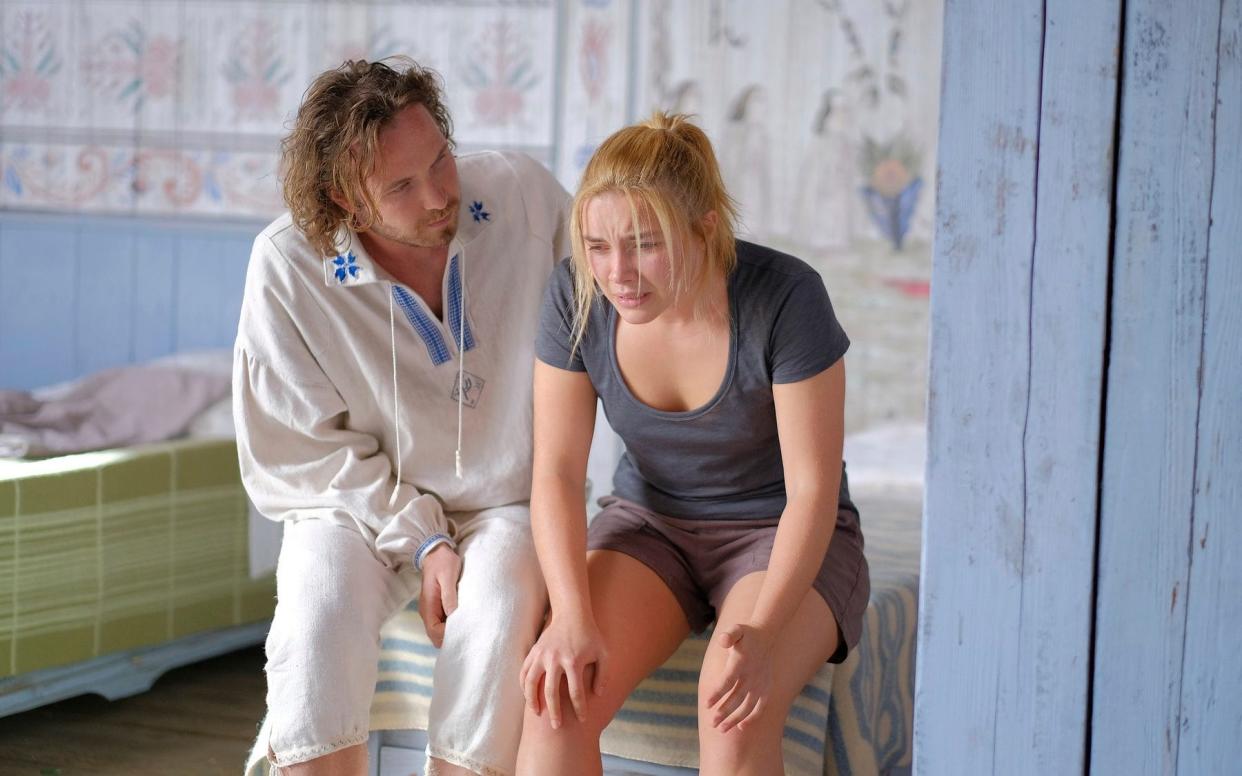Midsommar review: a sick, beautiful masterpiece from horror's new god of misrule

Dir: Ari Aster. Cast: Florence Pugh, Jack Reynor, William Jackson Harper, Vilhelm Blomgren, Will Poulter, Ellora Torchia, Archie Madekwe. 18 cert, 147 mins
If there was one thing last year’s occult shocker Hereditary taught us about its deviously gifted writer-director, Ari Aster, it’s not to trust him in the slightest. Think Midsommar, his much-hyped follow-up, looks like Aster’s answer to The Wicker Man? Well, it is, kind of – but that’s not to say you’ll come anywhere near predicting its singular, warped response.
Midsommar, largely set during a blindingly bright nine-day pagan festival in Sweden, is a delicious prank of a film that’s by turns heroically upsetting and deeply funny. It’s barely serious, in fact, except when it absolutely means business. Aster is some new cinematic god of misrule, tickling blossoms under your nose with one hand, while he uses the other to sneak a poisoned blade almost lovingly between your ribs.
The first 20 minutes, set in America, operate in stark contrast to everything else. From the looks of things, Hereditary’s dank, traumatised colour palette has bled directly into this prologue, along with the low, churning soundscape of something hideous waiting in the wings.
College undergrad Dani (Florence Pugh) is fighting to remain calm while a skin-crawling family catastrophe looms, and her boyfriend Christian (Jack Reynor), who has half a foot out of this relationship, semi-patiently fields her panic over the phone, in the company of three male buddies rolling their eyes.
It’s a brilliant sketch of a relationship in denial, with one side leaning on it for dear life while the other sidles closer to an exit. Aster uses it to plant a bed of instability under every subsequent scene. The rest could easily be read as a hallucinatory nightmare about where these two are headed, with sexual jealousy and insecurity seeded through it like taunting creeper vines.
Unbeknownst to Dani, Christian has been plotting a summer getaway with his trio of pals, who include Pelle (Vilhelm Blomgren), a curious Swede descended from a tribe called the Harga in flowery Hälsingland; an anthropology student called Josh (William Jackson Harper); and a horny clown, Mark (Will Poulter).
Much to their joint displeasure, Dani winds up tagging along, now in the lunging throes of grief after a multiple bereavement so horrendous you can barely imagine surviving. Thereby shackled to her as a shoulder to cry on, Christian squirms, ruing his own bad luck, while his friends (especially Mark) resent every moment in her company.
This is not the recipe for dropping magic mushrooms – as the quintet do before they’ve even sat down – and having a reliably happy time. But as their heads swim and they explore the idyllic meadows around the Harga commune, we sink with strange bliss into a scenario where almost anything goes.

We’ve seen enough horror films cruder than this to know that taking a chair for an al fresco banquet with dozens of strangers in white robes, and imbibing whatever weird cordials they set before you, is unlikely to be a health-giving treat in the long run. Aster leans delectably into our sense of anticipation, and builds a central set-piece, about the fate awaiting two elders, with immaculate and teasing patience.
He’s very clever with his camera, using it again and again to test which pages the characters are on, with a slight reframe here or a rack-focus there to make their thoughts collide. Or he isolates Dani, who seems to intuit the coming horrors more viscerally than anyone else, as someone with her own ghastly personal history of trepidation.
Pugh’s part could hardly be more emotionally challenging, and she’s harrowingly good. She gets in a high key of gulping distress from the start and keeps trying to fight it back down, as the only character on screen who tends, understandably, to assume that the worst is over.
For most of them, the worst is very much yet to come. You’d never guess the film’s comic potential from the opening movement, but the grindingly believable tensions between boyfriend, girlfriend, and boyfriend’s chums have to give way somehow; their first drug experience, woozily intense, winds up being hysterical, too.
This is largely thanks to Poulter, whose entire performance suggests a character who thinks he’s in Eurotrip and merely awaits the wake-up call. “You pissed on our ancestral tree!”, directed at him, stakes an instant claim to become the funniest line of the year, with “we don't break traffic laws” (it’s all about the context) later running it a close second.
The film’s mischief often overrides scares and you really don’t mind – it’s doubly entertaining having them spar. With digital trickery subtly infecting the imagery – flowers morphing, faces melting – it’s like a good-bad acid trip in a diabolical state of flux.

Reynor, fearless, does a crucial balancing act in his part, too – we need to guess at Christian’s level of selfishness without sussing it out for certain, and maybe he doesn’t even know himself, until the drugs lend an alibi, and the crunch comes.
Where most horror directors spike the jump scares with massive attacks of Dolby bass, Aster does the opposite. You’ll need to train your ears to make out the distant sound of one minor character dismally screaming. Or the clucking of hens, which sounds increasingly like malevolent laughter.
You'll wonder why someone’s drink is a subtly different shade from anyone else’s; why scissors are stashed behind a baby’s head; what happens when your number comes up in Swedish pagan bingo. You'll weigh every possibility in the pit of your stomach. Sick but also beautiful, the film gets away with an impressively audacious running time, simply because it can. It dazzles you with dread.

